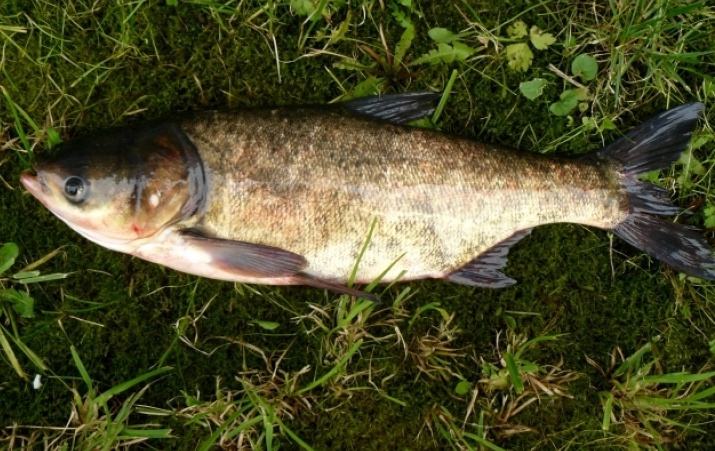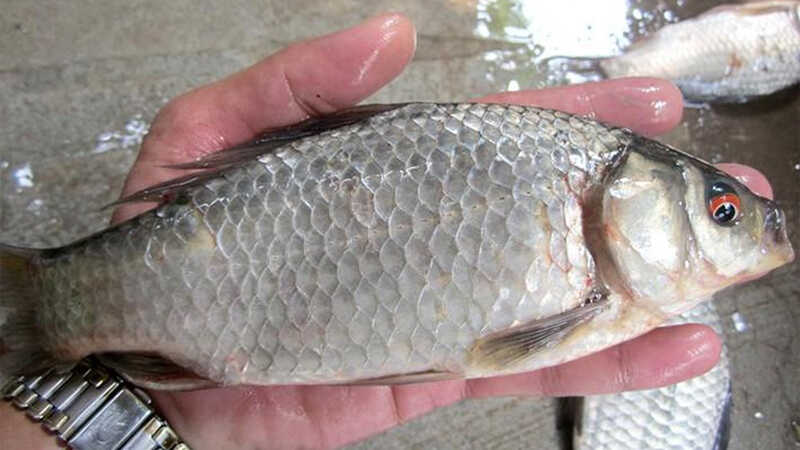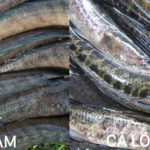Cá chép

Carp is known for its mild and nutritious properties, often used by pregnant mothers for supplementation.
According to traditional medicine, carp has a sweet taste, neutral nature, rich in protein and abundant vitamins, and has the function of treating coughs, asthma, lactation, promoting urination, and benefiting digestion.
For individuals with water retention, watery diarrhea, jaundice, urinary obstruction, pregnancy edema, incorporating carp into the diet is recommended.
Whitebait
This type of fish has a mild flavor when consumed in small amounts, lean meat, and is affordable. Nutritionists have stated that Whitebait contains a lot of omega-3. This substance exists in the form of fatty acids that produce DHA. DHA plays a crucial role in brain development, benefits the brain, improves cardiovascular health, and regulates blood pressure.
Bloodybelly combtail

In 100g of Bloodybelly combtail, there are 15.3g of protein, 2.2g of fat, 82mg of calcium, 18mg of phosphorus, 0.8mg of iron, 229mg of potassium, and 4.7g of carbohydrates. Additionally, it contains vitamins B1, B2, and vitamin E.
In traditional medicine, Bloodybelly combtail is considered to have a warming effect, sweet taste, beneficial for individuals suffering from headaches, dizziness, blurred vision, excessive phlegm, hypertension, kidney deficiency, back pain, joint pain, weak tendons and bones, poor digestion, limb edema, and weakened sense of taste.
Panio
Panio is a freshwater fish and is commonly found in rural areas, and is sold at a very low price. Panio contains protein, calcium, potassium, magnesium, selenium, fats, and numerous other nutrients.
Moreover, panio fish has tender, easily digestible meat, suitable for children, the elderly, and individuals with poor digestive function. Furthermore, this type of fish also acts as a blood supplement and is beneficial for the stomach.
Common carp

Common carp is one of the well-known and nutritious fish; it contains numerous vitamins and minerals such as omega-3 fatty acids, protein, vitamin B6, vitamin B12, selenium, phosphorus, potassium, niacin, and pantothenic acid,
What sets this type of fish apart is its high protein content coupled with low-calorie and low-fat levels, and it contains the lowest mercury levels compared to other fish.
Every 100g of common carp contains 26g of protein and only 2g of fat, making it suitable for children over two years old, pregnant or breastfeeding women.
White croaker
In 100g of white croaker meat, it contains 75.2g of water, 19.4g of protein, 185mg of phosphorus, 0.6mg of iron, 145mg of sodium, 263mg of potassium, 27mg of vitamin A, 2mg of vitamin PP, 1mg of vitamin C, vitamins B1, B2, 5.4g of lipids, 1.1g of ash, and 15mg of calcium.
This type of fish is recommended for individuals with poor appetite, weak bodies, chest discomfort, headaches, blurred vision, dizziness, insomnia, poor sleep, forgetfulness, fatigue, numbness in the neck, waist, and limbs.
Snakehead fish
Snakehead fish has high nutritional value. Particularly, omega-3 in snakehead fish has the effect of treating joint pain and reducing inflammation. Moreover, this type of fish has low fat content and low cholesterol levels, making it good for the heart and effectively improving the immune system.
Elephantnose fish

This ‘native fish’ has thick meat, a sweet taste, is non-toxic, and contains many nutrients. In traditional medicine, elephantnose fish is considered as a valuable tonic herb, especially for pregnant women. It has a mildly balanced taste with the ability to replenish vital energy, cleanse internal heat, promote water circulation, quench thirst, and have antibacterial properties. Therefore, elephantnose fish is used to treat various illnesses.
Due to its rich nutritional content, elephantnose fish is also used for individuals suffering from long-term illness, poor physical condition, poor appetite, sour regurgitation, and indigestion. Especially, pregnant women in the first three months of pregnancy who experience morning sickness should consume elephantnose fish to nourish their bodies.



































